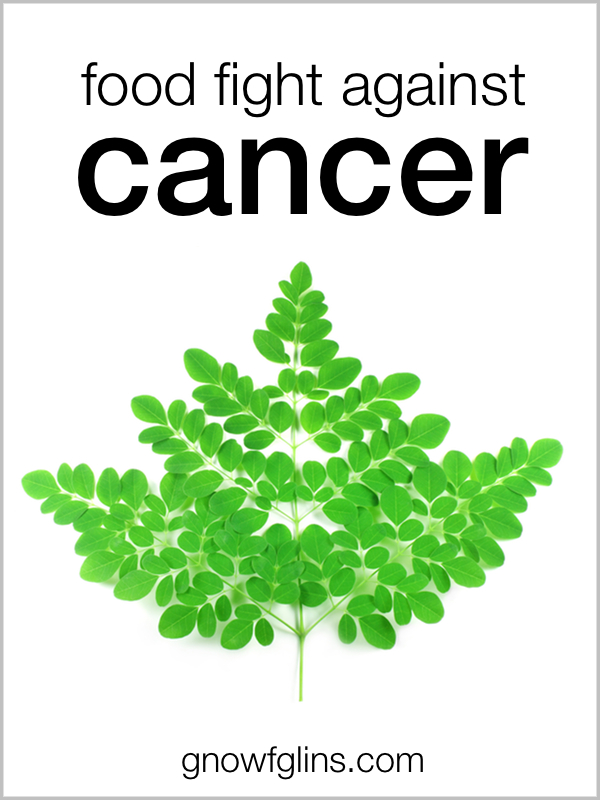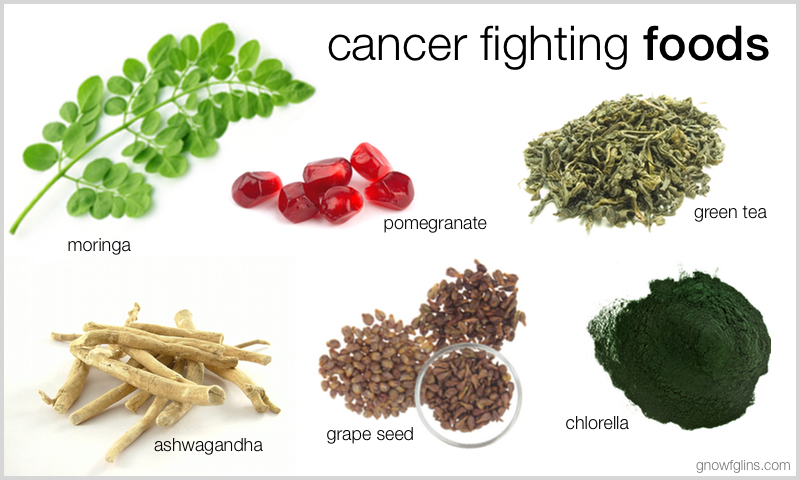
Cancer.
It used to be a scary, foreign, medical word.
Now it’s a scary, common word that people assume they will have one day.
According to The World Cancer Report, reported cancer cases hit an estimated 14 million in 2012. In the next twenty years, new cancer cases are predicted to rise by 57% and reach an astounding 22 million. It’s a scary thought, and one that encourages us to rediscover foods that help fight cancer.

Six Cancer-Fighting Foods
1. Grape Seed
Grape seed showed significant anti-cancer activity in a study done by the University of Colorado Cancer Center. B2G2, the most active component of grape seed extract, inhibited cell growth and promoted the death of prostate cancer cells while leaving healthy cells undamaged.
2. Chlorella
Chlorella is shown as a powerful superfood with “protective anti-tumor effects” by numerous studies.
“Japanese scientists studied Chlorella pyrenoidosa as a biological response modifier. . .Since chlorella does not directly kill cancer cells, the scientists concluded that its effects were caused by boosting the immune response.” Dr. Ralph W. Moss PhD, Cancer Therapy
“In another experiment, a group of scientists took a hot water extract of chlorella and injected it into the body cavities of mice that had first been inoculated with tumor cells. They found that “survival times were strikingly prolonged.” Furthermore, when they gave mice injections of chlorella, their cells still exhibited “an anti-tumor effect” 24 hours later. This effect remained intact even after ‘T’ type white blood cells and macrophage (scavenger) cells were destroyed, but it was effectively wiped out by irradiation. Chlorella’s anticancer effect was thus dependent on the portion of the immune system most sensitive to x-rays.” Dr. Ralph W. Moss PhD, Cancer Therapy
3. Green Tea
There’s a lower risk of cancer in countries whose people regularly consume green tea, which contains antioxidant, anti-inflammatory, and anti-carcinogenic properties.
The University of Maryland Medical Center conducted a study involving 472 women with various stages of breast cancer. The study confirmed that women who drank the most green tea had the least spread of cancer (especially in premenopausal women in the early stages). It was also discovered that women with early stages of the disease who drank at least 5 cups of tea every day before being diagnosed with cancer were less likely to have the cancer come back after they finished treatment.
Studies done at the Alabama University of Birmingham concluded that “green tea polyphenols are photoprotective in nature, and can be used as pharmacological agents for the prevention of solar UVB light-induced skin disorders including photoaging, melanoma and nonmelanoma skin cancers…”
4. Pomegranate
Pomegranate, which we recently discussed as containing beneficial antioxidants and anthocyanins, is a huge player in the fight against cancer. Studies show that it destroys breast cancer cells; inhibits the development of lung cancer, colon cancer, and leukemia; and slows the growth of prostate cancer (second-leading cause of cancer-related deaths in men).
Researchers at the University of California, Riverside stated, “We show that pomegranate juice markedly inhibits the function of this protein, and thus this juice has the potential of preventing metastasis of the prostate cancer cells to the bone.”
We love fresh pomegranate and the kids have a ball whacking the seeds out, but you can also enjoy its benefits in concentrated juice form.
5. Moringa
Moringa is especially beneficial to women and has been shown to play a role in treating ovarian cancer.
Research from St. Bartholomew’s Hospital in London states that moringa’s effectiveness is derived from “a combination of anti-tumor and hormonal properties… The effectiveness of the moringa plant in treating ovarian cancer became evident after the publication of recent studies demonstrating that benzyl isothiocyanate (BITC) and phenethyl isothiocyanate (PEITC) induce apoptosis (cell death) in ovarian cancer cells in vitro. We knew that isothiocyanates have anti-tumor activity in cancers of the lung, breast, skin, esophagus, and pancreas, but we did not know that it can also induce apoptosis in ovarian cancer cell in vitro.”
Moringa is easily taken in nutritional shakes like my favorite, Shakeology (which contains all the cancer-fighting foods listed here) or in capsules. And if you’re in the right planting zone, Angi from Schneider Peeps shows us how easy it is to grow moringa in the garden.
6. Ashwagandha
Ashwagandha, an exotic Indian herb, is considered the “ginseng” of Ayurvedic medicine. Studies have shown that it has significant anti-cancer results.
“The alcoholic extract of the dried roots of the plant. . .showed significant anti-tumor and radiosensitizing effects in experimental tumors in vivo, without any noticeable systemic toxicity,” says a study from Kasturba Medical College in India.
“…it can be concluded that Withania somnifera (Ashwagandha) reduces tumor cell proliferation while increasing overall animal survival time,” says this study.
Recommended Reading
- Cancer: Step Outside the Box
- Cancer Therapy
- A Holistic Approach to Cancer
- Cancer: You Are What You Eat
- Cancer Tutor
Sources
Active component of grape seed extract effective against cancer cells.
Skin photoprotection by green tea: antioxidant and immunomodulatory effects.
Pomegranate juice components could stop cancer from spreading, research suggests.
Cancer Chemoprevention by Pomegranate: Laboratory and Clinical Evidence.
Ancient medicine, modern use: Withania somnifera and its potential role in integrative oncology.
Chlorella as a powerful defense against cancer.
What are your favorite cancer-fighting foods and herbs?
We only recommend products and services we wholeheartedly endorse. This post may contain special links through which we earn a small commission if you make a purchase (though your price is the same).


My zone won’t support moringa but I can definitely be drinking more green tea. 🙂 Great post!
Jenny, you can grow moringa in a pot in colder climates. It sends down a tap root so you would want a pot that that is deeper rather than wider. I agree, there are so many things we can do here and there, this is a great list.
That’s great to know Angi! Thanks. I may give it a try.
My partner has cancer (two, actually) and is now following more of a plant-based diet. Her response to treatment has been phenomenal. Just over half way through and her marker has returned to normal! We can’t say she’s in remission till the post-treatment scan, but hearing the marker was normal was like winning the lottery!
One of the websites which gave us lots of tips on the kinds of cancer-fighting foods we should focus on eating is nutritionfacts.org. It’s got lots of short videos – great for chemo brain! The narrator has an odd voice but you get used to it.
We’ve done things like add berries to smoothies and more spices to foods, and substantially increased our veggie intake.
Cancer gave us quite a scare, but so did the treatment. It’s much better than it used to be even 5 years ago, but we wouldn’t wish this on anyone. We are still extremely grateful to have access to the treatment.
There is a plant that the locals here say can fight cancer – Sabah Snake Grass. I don’t know whether it truly works or not but my mom-in-law has a friend who survived breast cancer (more than a decade cancer free now) and she says she avoids oil, dairy products and steams her poultry.